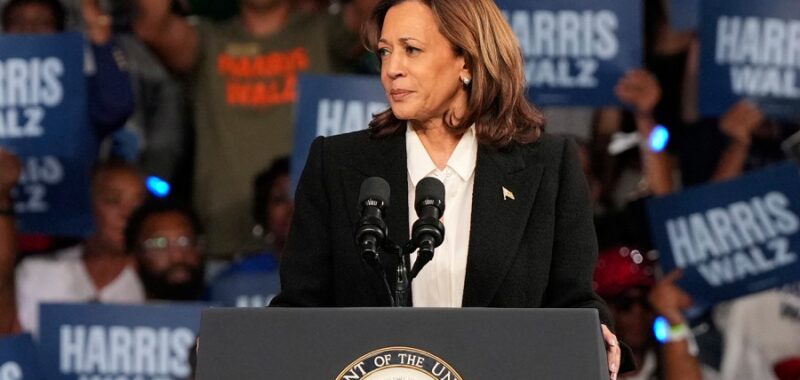
The tides of the election are turning against Vice President Harris.
During the late summer and heading into fall, Harris appeared to be the candidate with the momentum, with Democrats comparing her candidacy to former President Obama’s in 2008.
After President Biden dropped out of the race, Democrats had made gains in the polls, making up lost ground where Biden had stumbled.
But recent polls suggest that energy has leveled off. While Harris still has a narrow edge over President Trump nationally and in several battleground states, she has been losing ground.
Poll numbers from Decision Desk HQ, for example, show she has lost 4 percentage points in the past month.
In the past two weeks, there has been a slight trend toward Trump in some of the battleground states.
In Wisconsin, for example, Harris went from leading Trump by two points to being tied.
In Michigan, she also went from leading by a point to Trump leading by 1 point. And in Pennsylvania, Harris went from leading Trump by a point to being in a dead heat.
While these polls are within the margin of error, Scott Tranter, the data science director for Decision Desk HQ, put it this way: “In a race that hasn’t moved a lot over the past couple of months, this is considered significant movement.”
In recent weeks, some Democrats who have been watching the ever-so-slight changes in the polling have grown concerned that the election could go sideways for them.
“We should be on an upward trajectory,” said one Democratic strategist. “That’s the sign of a campaign that’s on its way to winning. The fact that we’re not is troublesome to say the least.”
Another strategist agreed, saying: “This is not where we want to be with less than three weeks to go. This is terrifying.”
The Harris campaign is taking chances, putting the vice president on Fox News for an interview Thursday night. It’s a bold move, and one some thought the candidate might not have made if she were further ahead.
Obama made waves last week when he scolded Black male voters about supporting Harris, suggesting she could lose without them coming out in big numbers. The tone of Obama’s remarks were notable and again seemed to point to larger concerns within the Democratic Party about the race.
Other polling averages also show movement in Trump’s direction over the past week.
Battleground polling averages for Real Clear Politics reveal changes — however slight — toward the former president.
Nate Silver, the prominent statistician, has found similar patterns in his polling averages, with Trump gaining as much as a point since last week in Wisconsin and a point in Nevada.
None of this means Harris or Trump should feel overly comfortable or panicked. Silver noted that he’s “never seen an election in which the forecast spent more time in the vicinity of 50/50.”
An NBC News poll out this week also showed the race in a dead heat at 48 percent, after Harris held a 5-point advantage a month ago following Harris and Trump’s faceoff at their first debate.
The poll also highlighted a dramatic shift in voters’ perception of Harris. A month ago, 48 percent of those surveyed said they had a positive impression of the vice president, while 45 percent said they had a negative perception. A month later, Harris had fallen to 43 percent positive and 49 percent negative.
“She was above water, as they say,” NBC’s Steve Kornacki explained to “Today” show host Savannah Guthrie on the program earlier this week. “That’s completely reversed. It now looks similar to Trump’s. That’s a pretty big shift when you’re talking about a race this close.”
Betting markets have also indicated Trump has taken the lead over Harris for the first time in weeks.
As of Wednesday, Polymarket shows Trump having a 57 percent chance of winning the election, while Harris had a 41 percent chance; Kalshi, which recently won a legal battle to allow election betting nationally, gives Trump a 54 percent chance of defeating Harris.
Still, the news wasn’t all bad for Harris.
A Marist Poll published Wednesday showed Harris leading Trump among likely voters nationally 52 percent to 47 percent, an increase from earlier this month, when the same poll found Harris ahead by 2 points.
The Harris campaign has also signaled it’s not sweating public polling that may fluctuate from week to week or averages that could be impacted by partisan surveys.
“I spend very little time looking at them,” senior Harris adviser David Plouffe said of public polls during a recent appearance on “Pod Save America.”
“And most of them are horses‑‑‑. Some of them may be close, but, generally, I’d say any poll that shows Kamala Harris up 4 to 5 points in one of these seven states, ignore it. Any point that shows Donald Trump up like that, ignore it,” Plouffe said. “This thing’s very close. It’s a margin-of-error race.”
Julian Zelizer, a professor of history and public affairs at Princeton University said while Trump has “some momentum,” the horse race is “all within the range of a 50-50 split that can really go either way.”
“The ground game will be the most important,” he said, suggesting whichever side turns out more voters could win.
But Zelizer said what’s “most striking historically is that he can hold his position with the party despite threatening to use military force against opponents, spreading false stories about immigrants that is stoked in nativist rhetoric, and play to racial and gender backlash. The fact that this doesn’t depress his support in 2024 says more about the state of the GOP than anything else.”
Trump may have a slight edge according to polls. But Tranter said he hasn’t seen a race this tight in modern history.
“Neither candidate should be surprised if they win or lose,” he said.
Brett Samuels contributed.

